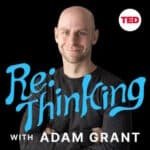Reading Time: 2 minThe state of learning (particularly memorization) is at a weird place in time. Since the launch of Google 25 years ago, and steadily increasing as things like Wikipedia, smartphones, and AI came along, the need to memorize information has become less important. However, it’s becoming increasing important to develop the ability to connect information to […]
Mental Models
A good mental model of the internet is essential
Reading Time: 2 minI’ve talked a lot about mental models on here over the years, and even did a series of them a while back (found here). Charlie Munger is a huge proponent of them, and I found my time digging through them to be very worthwhile. However, there are models that can be more specific than the […]
Thought Experiments
Reading Time: < 1 minThe last mental model that I’m going to unpack, before going back to my normal cadence of blogging, is the idea of “thought experiments”. While these mental models were presented in alphabetical order, this one is a perfect one to end on, as it’s a great way to tie all of the rest together. Sometimes […]
The Map Is Not the Territory
Reading Time: < 1 minThe best map you’ve ever seen is imperfect. It has to be. If a map were to contain every bit of information about the area it represented, it’d be a cluttered mess. Every map has some degree of imperfection, and a large degree of omitted information. As the Farnam Street blog says, “A map with […]
Social Proof
Reading Time: < 1 minThe mental model of Social Proof is used frequently in marketing, but it’s a bit deeper than I’ve often realized. The main concept, as written by Robert Cialdini in his 1984 book “Influence” is that it: maintains that a person who does not know what the proper behavior for a certain situation is, will look […]
Skill Stack
Reading Time: < 1 minThe next mental model that I’m digging into is the concept of the “skill stack”. The idea behind this is that having a wide range of skills can help multiply your success. It’s similar to the idea I shared earlier this year about wider study helping even in narrow fields. Andrew McVagh gives a great […]
Second-Order Thinking
Reading Time: 2 minThe mental model of Second-Order Thinking simply means to look beyond your initial output, and think about what other consequences might result from it. A great way to think about this is to use a similar pattern to the Five Whys, and just follow your decision with a few “And Then What?” statements. A good […]
Redundancy
Reading Time: < 1 minThe mental model of redundancy is one that we’re all familiar with, and likely becomes more engrained as we grow older and learn from our mistakes. Creating redundancy can take a bit of work, but has tremendous benefits if it’s called into play. A common redundancy that I push for is to keep more backups […]
Reason Respecting
Reading Time: < 1 minThe mental model of Reason Respecting, sometimes known as “Because Why”, is the idea that giving reasons behind requests make people much more likely to succeed at the task you’ve given them. There are a few good examples of this, some of which almost seem counter-intuitive. The 1977 Copy Machine Study is a great example. […]
Probabilistic Thinking
Reading Time: 2 minThe next mental model I’m digging into is the idea of Probabilistic Thinking. This is the effort to try to determine the likelihood of any particular outcome ahead of time. With most things in life there are an infinite set of factors to consider, but you can focus on the big ones and get a […]


